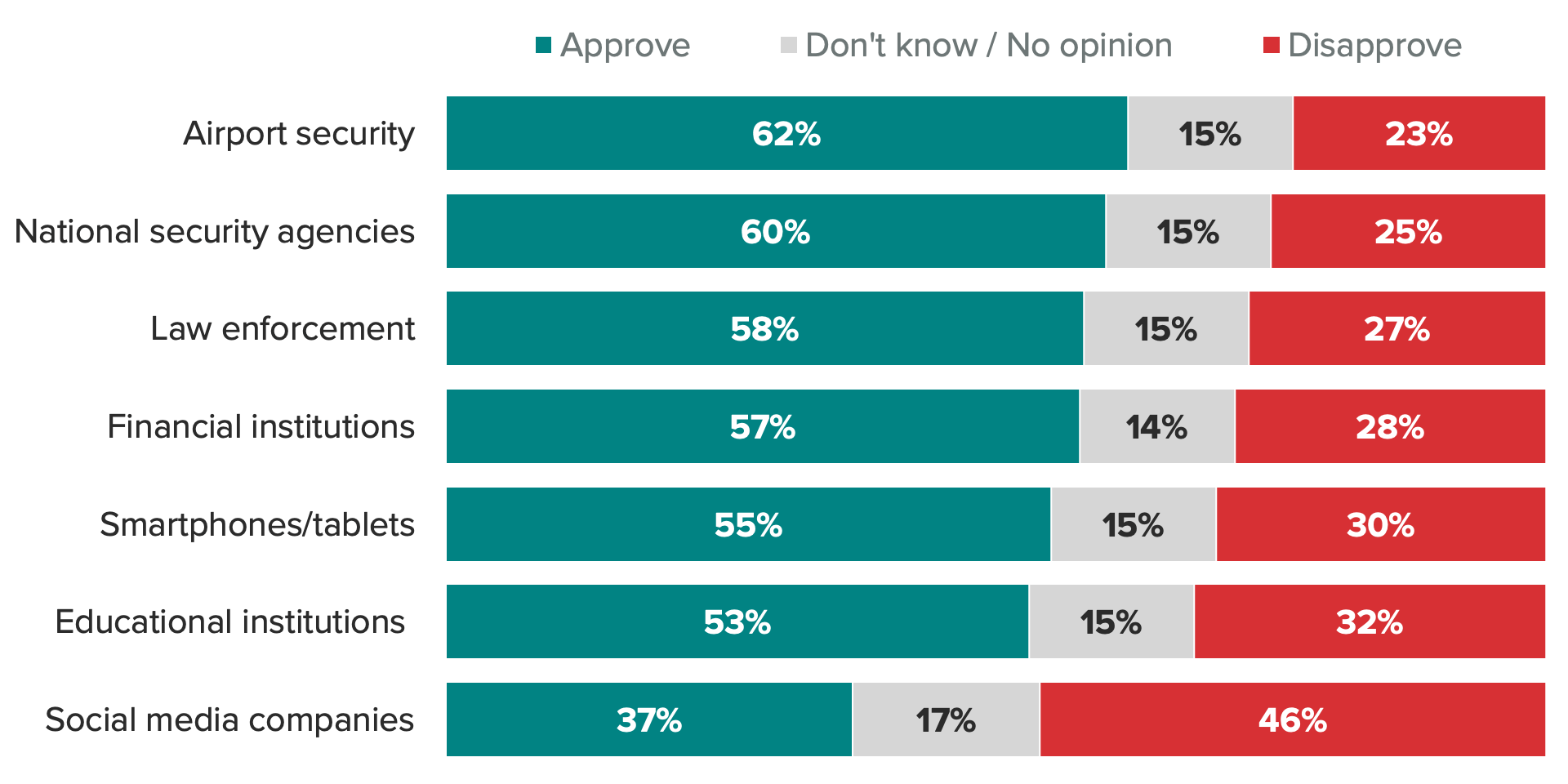Americans Have Grown More Comfortable With Facial Recognition Tech

Data Downloads
Pro+ subscribers are able to download the datasets that underpin Morning Consult Pro's reports and analysis. Contact us to get access.
The Transportation Security Administration’s rollout of facial recognition technology has prompted a legislative fight that’s pitting the airline industry and the Trump administration against Democrats and old-school conservative privacy hawks who are looking to add mild guardrails to the tool’s use in federal agents’ airport screening procedures.
In Washington, this under-the-radar battle has reignited debates over privacy and the technology’s biases — alongside fears elevated by Democrats who warn its adoption smacks of creeping authoritarianism.
Across the country, Morning Consult’s latest research on facial recognition shows an increasing acceptance of the budding technology that’s being buoyed by the rapid, hardly regulated advancement of artificial intelligence. This is especially true when it comes to the government’s use of it, though many Americans do continue to hold concerns about their privacy as facial recognition technology emerges more in daily life.
According to our Aug. 29-31 survey, voters have become more comfortable with the use of facial recognition software since 2019, with those supporting its use increasing from 42% to 48%.
The biggest increases came among Republicans, white voters, those from richer households and young people — the latter of whom have grown to be more in line with their older peers.
Support for facial recognition tech is on the rise

Still, the survey shows a growing partisan gap in acceptance: Republicans are now 12 percentage points more likely to support its use than Democrats, up from a 6-point gap in 2019. A wealth gap has also opened up on the question, with those from middle- and higher-income households becoming more supportive, and backing among low-income households remaining tepid.
Against the backdrop of increasing comfort for facial recognition tech, we also find that some applications are more popular than others.
For example, majorities of Americans approve of the use of facial recognition software by TSA, national security agencies, law enforcement, banks and financial services institutions, schools and universities and devices such as smartphones and tablets. Meanwhile, just 37% of Americans approve of social media companies’ usage of facial recognition tech.
Government use of facial recognition tech draws most approval

The relatively broad backing for the government’s various uses of the growing technology comes as the Trump administration works to expand its deployment in search of efficiencies in law enforcement efforts.
In a larger sense, advocates for the use of facial recognition software have public opinion at their back — giving a boost to the airline industry as it pushes broader adoption of the technology to increase airport efficiencies and the Trump administration deploys it in its Immigration and Customs Enforcement efforts.
However, that isn’t to say voters don’t still have concerns. Roughly 2 in 5 voters (41%) still think their personal information captured by facial recognition technology is not secure.
Security concerns about facial recognition tech remain prevalent despite a recent softening

While that figure is down significantly from five years ago, only 44% of voters trust the security of such data today, highlighting an ongoing vulnerability for the government, industries that use the technology and indeed those who provide it in an age where data breaches are not uncommon.
The bottom line
Americans who are white, in their peak working years or make more money — the kinds of people who are perhaps most likely to show face the most in the airport security line and come into contact with the government’s use of it the most — are willing to give the benefit of the doubt despite retaining underlying concerns that could be activated if something goes wrong, such as a major breach.
Older Americans and those making less money — likely less frequent travelers who may be most likely to come across the tech when using their personal devices — are likely to be more of an obstacle for rolling out facial recognition technologies.
This data suggests that policymakers looking to put guardrails on facial recognition technologies, industries embracing its adoption and those producing it should keep the public’s concerns about the security of their private personal data top of mind, or risk losing the general goodwill that’s grown as it has seeped into day-to-day lives.
Eli Yokley is Morning Consult’s U.S. politics analyst. Eli joined Morning Consult in 2016 from Roll Call, where he reported on House and Senate campaigns after five years of covering state-level politics in the Show Me State while studying at the University of Missouri in Columbia, including contributions to The New York Times, Politico and The Daily Beast. Follow him on Twitter @eyokley. Interested in connecting with Eli to discuss his analysis or for a media engagement or speaking opportunity? Email [email protected].